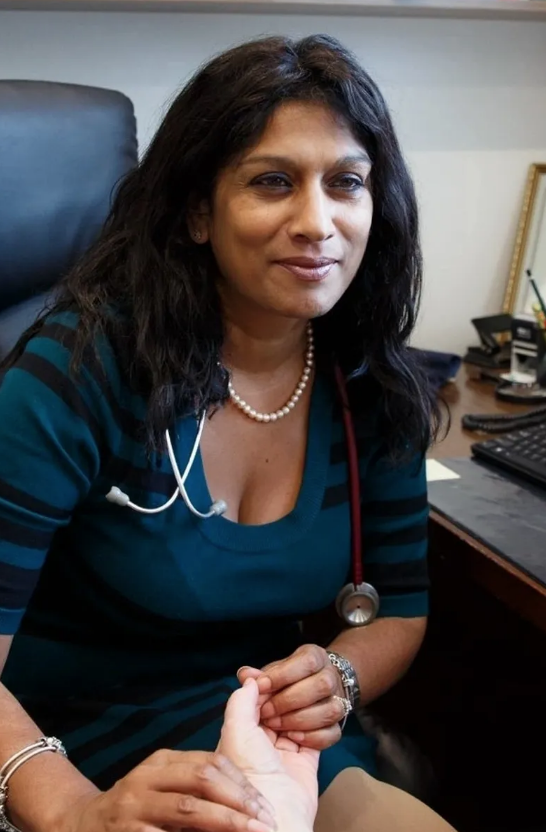Dr Barri Phatarfod used to work in rural medicine – now she helps another vulnerable group with limited access to health care.
Dr Barri Phatarfod, a Sydney GP and refugee rights advocate, is no stranger to making decisions under pressure.
“I remember once talking to someone in St. Vincent’s, and someone at the Royal Prince Alfred – and at that point, they were both saying, ‘well, I think he’s an RPA person’,” she tells TMR.
“I said, ‘

Working as a locum in that rural NSW town during the 1990s, Dr Phatarfod says she found rural medicine “more real”, on several levels – a far cry from her later role as a GP in Sydney’s affluent eastern suburbs.
“You don’t see anything like that in Rose Bay,” she says.
Dr Phatarfod graduated in medicine from Monash in 1988, after which she moved to New South Wales and became a “Sydneysider through and through”, and now practises in Surry Hills.
In her earlier years as a doctor, she also took locum jobs in regional towns such as Bourke and Junee, during which time she often had to make high-stakes decisions or take risks with patient safety.
“Anyone with anything serious isn’t going to go to their practice in Rose Bay and say, ‘I’ve had chest pain and difficulty breathing’ – they’re hightailing it to St. Vincent’s,” Dr Phatarfod said.
“Whereas in Bourke, you have to look at them and make the call on whether you need an air ambulance to take them to the nearest town.”
Years later, in 2013, Dr Phatarfod saw another vulnerable group with limited access to medicine: asylum seekers being kept in offshore detention facilities.
Under Kevin Rudd’s Labor government, asylum seekers coming to Australia by boat were to be resettled in Papua New Guinea’s Manus Island or in Nauru.
Later that same year, the newly elected Abbott government made the decision to disband the Immigration Health Advisory Group, the independent body that provided advice on the physical- and mental-health needs of asylum seekers.
The body was replaced by a single medical advisor, Dr Paul Alexander, who came from a Defence Force background.
These conditions, says Dr Phatarfod, made her concerned because the system for refugees became an opaque and unaccountable one.
“People who came by boat were being sent to Manus Island or Nauru, with no possibility of their coming to Australia,” she says.
“There was no longer any independent overseeing health body, [the asylum seekers are] in a third country, [the government] could pretty much do whatever they want.
“I can’t imagine anything more terrifying.”
In the aftermath, Dr Phatarfod felt it was her duty as a doctor to get involved.
“Doctors were being told that we have to [subordinate] our medical ethics to what the political agenda is of the day, and that’s not why any of us became doctors,” she says.
After finding a loophole in the new asylum seeker policy, one that allowed people in offshore detention the right to a second opinion on any medical condition, Dr Phatarfod set about founding advocacy group Doctors 4 Refugees with like-minded health practitioners.
The group would be referred cases by refugee advocates in the community – often volunteers with organisations such as the Uniting Church or other organisations corresponding with people in offshore detention.
“If any of [the asylum seekers] had a medical condition and mentioned it to their advocate – and many of these advocates would be across a dozen different people’s issues – then the advocate would contact us and say, ‘Hi, my name is Darren, I live in Melbourne and I’m really worried about this particular man,’” Dr Phatarfod says.
These health issues could range from self-harm and poor mental health to machete attacks and head injuries.
Finding cases, says Dr Phatarfod, is often one of the less labour-intensive aspects of the process; instead, filing the right paperwork can be difficult to achieve, given the lack of facilities available to people in offshore detention.
“To sign a consent form, you have to have access to a computer, and then access to a printer,” she says.
“Then you have to sign it, and then you’ve got to somehow scan or photograph it, upload it and send it all the way back.”
The group’s first success story was a patient with a benign tumour pressing against his spinal cord who was repeatedly denied surgery by the immigration health practitioners.
After successfully applying to view his clinical notes, Doctors 4 Refugees was able to book the man into surgery in Australia.
Despite refugee advocates often corresponding with several people at once, there are also some people in detention who do not engage with charities on the mainland, often feeling that not trusting or going against authorities will lead to an adverse outcome.
In 2016, when Sudanese refugee Faysal Ahmed – who was not in contact with any charities – died after a prolonged period of poor health, Dr Phatarfod says the lack of coordination in the refugee advocacy sector was at least partly to blame.
“I think if we combined our medical, legal and communications resources, we could be a lot more effective,” she says.
All doctors, she maintains, should feel a sense of duty to advocate for refugees.
“[The medical code of conduct] applies to everyone, you know, you can’t just exclude whoever the politically expedient group of the day is – whether it’s people from a different religion, people from a different class or single mums,” she says.
“It’s all well and good applying it across the board when there’s no political hysteria, or domestic scapegoating, but how do you apply it when there is?
“You have to apply your medical code – it was there before the Border Force Act.”
Dr Phatarfod maintains that, for refugees detained by Australia, access to healthcare is a right, not a privilege.
“It’s a medical issue,” Dr Phatarfod says. “And it’s really sad that they’ve chosen to politicise it.”




